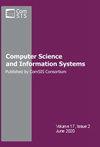A hierarchical federated learning model with adaptive model parameter aggregation
IF 1.2
4区 计算机科学
Q4 COMPUTER SCIENCE, INFORMATION SYSTEMS
引用次数: 1
Abstract
With the proposed Federated Learning (FL) paradigm based on the idea of ?data available but invisible?, participating nodes which create or hold data can perform local model training in a distributed manner, then a global model can be trained only by continuously aggregating model parameters or inter mediate results from different nodes, thereby achieving a balance between data privacy protection and data sharing. However, there are some challenges when deploying a FL model. First, there may be hierarchical associations between participating nodes, so that the datasets held by each node are no longer independent of each other. Secondly, due to the possible abnormal delay of data transmission, it can seriously influence the aggregation of model parameters. In response to the above challenges, this paper proposes a newly designed FL framework for the participating nodes with hierarchical associations. In this framework, we design an adaptive model parameter aggregation algorithm, which can dynamically decide the aggregation strategy according to the state of network connection between nodes in different layers. Additionally, we conduct a theoretical analysis of the convergence of the proposed FL frame work based on a non-convex objective function. Finally, the experimental results show that the proposed framework can be well applied to applications in different network connections, and can achieve faster model convergence efficiency while ensuring the accuracy of the model prediction.具有自适应模型参数聚合的分层联邦学习模型
基于“数据可用但不可见”的思想,提出了联邦学习(FL)范式。,创建或持有数据的参与节点可以以分布式的方式进行局部模型训练,则只需将来自不同节点的模型参数或中间结果不断聚合,即可训练出全局模型,从而实现数据隐私保护与数据共享的平衡。然而,在部署FL模型时存在一些挑战。首先,参与节点之间可能存在层次关联,因此每个节点持有的数据集不再相互独立。其次,由于数据传输可能出现异常延迟,会严重影响模型参数的聚合。针对上述挑战,本文提出了一种针对分层关联参与节点的新设计的FL框架。在该框架中,我们设计了一种自适应模型参数聚合算法,该算法可以根据不同层节点之间的网络连接状态动态决定聚合策略。此外,我们对基于非凸目标函数的FL框架的收敛性进行了理论分析。最后,实验结果表明,该框架可以很好地适用于不同网络连接的应用,在保证模型预测准确性的同时,可以实现更快的模型收敛效率。
本文章由计算机程序翻译,如有差异,请以英文原文为准。
求助全文
约1分钟内获得全文
求助全文
来源期刊

Computer Science and Information Systems
COMPUTER SCIENCE, INFORMATION SYSTEMS-COMPUTER SCIENCE, SOFTWARE ENGINEERING
CiteScore
2.30
自引率
21.40%
发文量
76
审稿时长
7.5 months
期刊介绍:
About the journal
Home page
Contact information
Aims and scope
Indexing information
Editorial policies
ComSIS consortium
Journal boards
Managing board
For authors
Information for contributors
Paper submission
Article submission through OJS
Copyright transfer form
Download section
For readers
Forthcoming articles
Current issue
Archive
Subscription
For reviewers
View and review submissions
News
Journal''s Facebook page
Call for special issue
New issue notification
Aims and scope
Computer Science and Information Systems (ComSIS) is an international refereed journal, published in Serbia. The objective of ComSIS is to communicate important research and development results in the areas of computer science, software engineering, and information systems.
 求助内容:
求助内容: 应助结果提醒方式:
应助结果提醒方式:


